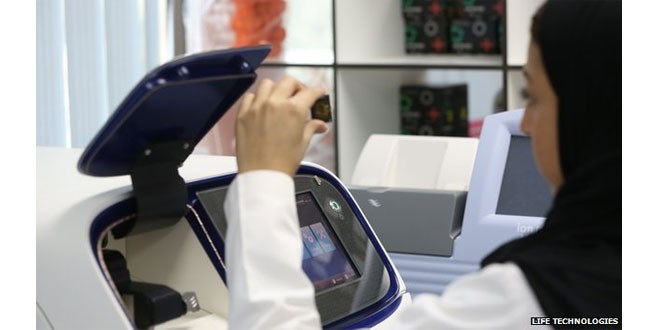The Kingdom of Saudi Arabia has launched a new human genome project in which they plan to map up to 100,000 people’s genetic codes.
So, why would they map the genetic codes? What will they get out of it? A lot of data and information about diseases linked to the genes. Which might eventually help to prevent them through prenatal and premarital screening.
A similar study is also being carried out in the U.K. which is in under way to map the genomes of 100,000 NHS patients.
Genome studies are moving from analysing the personal DNA code of individuals for research purposes, to clinical applications, such as treatments tailored to the genetic makeup of cancers.
The Saudi effort will focus on sequencing 100,000 human genomes over the next five years to study both normal genes and those linked to disease.
King Abdulaziz City for Science and Technology president Dr Mohammed Bin Ibrahim Al Suwayl said: “We have clear strategy and policy of the importance of science to a knowledge-based society and we believe the Saudi human genome programme will help shape the understanding of health and disease and usher in an era of personalised medicine in the Kingdom of Saudi Arabia and we are grateful for the investment and vision of the Saudi leadership.”
The research will take place at 10 genome centres across Saudi Arabia, with another five genome centres to be created in coming years.
UK genome expert Dr Ewan Birney, said while big genetic differences between Middle Eastern populations and populations outside the Middle East were unlikely, there may be a slightly different spectrum of genetic diseases in Saudi Arabia.
Commenting on the announcement of the project, Dr Birney, associate director at the European Molecular Biology Laboratory – European Bioinformatics Institute, said: “I’m excited that Saudi Arabia is taking a substantial step forward in sequencing genomes in their clinical healthcare.
“I hope to see broader engagement between Western countries and Middle Eastern countries in this area, and data sharing and expertise sharing in both directions.”
A number of genome sequencing efforts are under way around the world. They include the 1,000 genomes project, an international research effort to look at human genetic variation.
The UK is to map the genomes of up to 100,000 NHS patients with cancer and rare diseases by 2017 in a £100m effort funded by the government.
 Thfire.com Everyday news that matters
Thfire.com Everyday news that matters 
